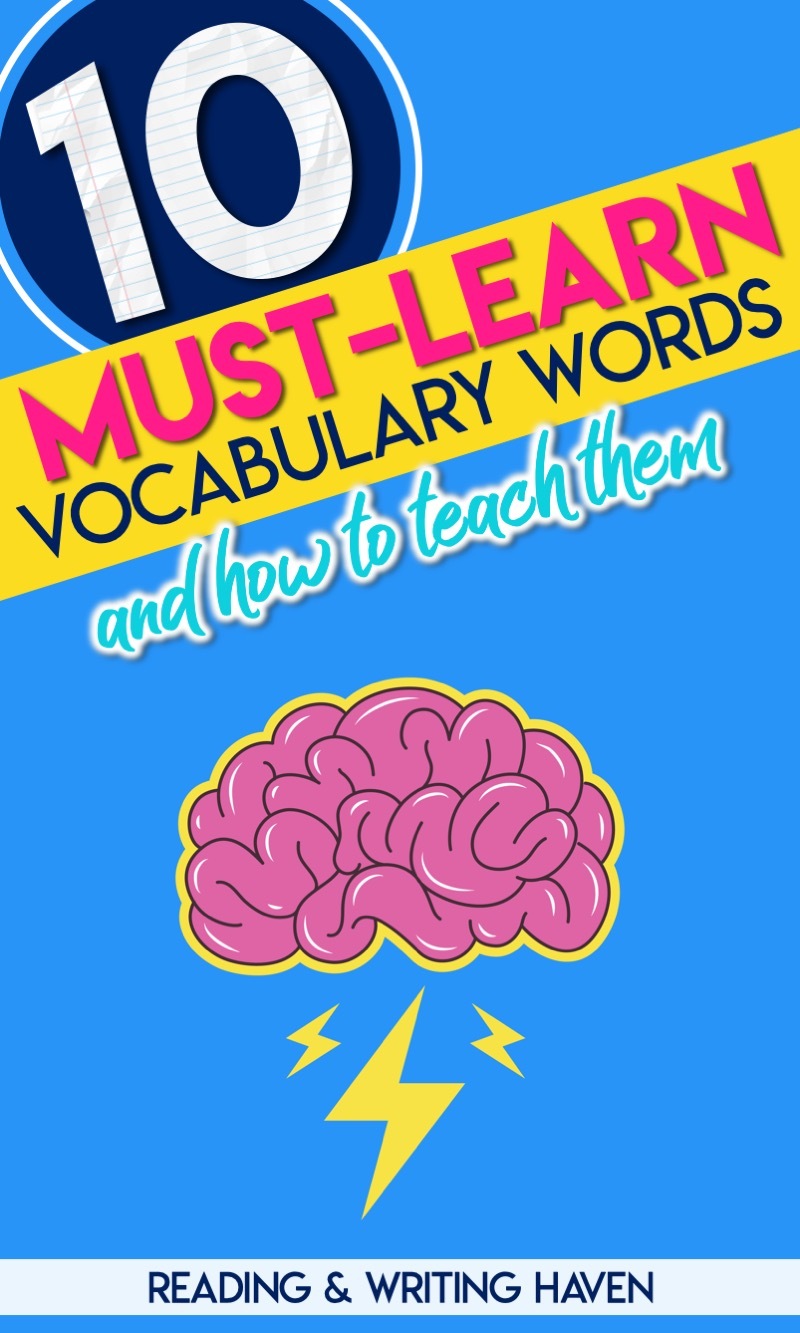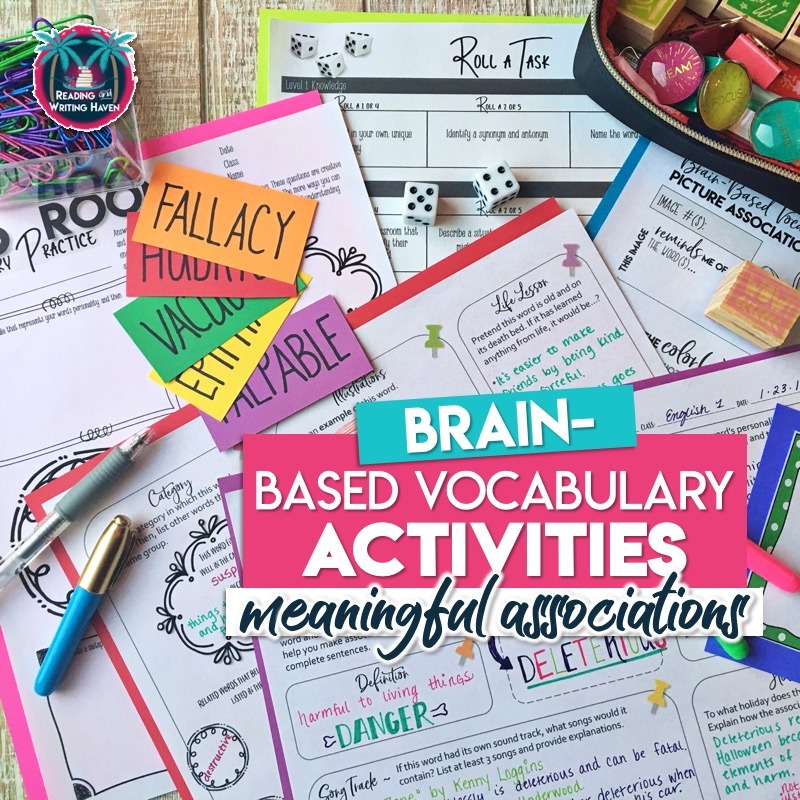10 Must-Teach Vocabulary Words
I’ve written a lot about how teaching vocabulary can be engaging as well as how to help students retain new word meanings. In this new post, I’m writing about specific words that my students and I have enjoyed studying together. It was extremely hard to choose must-teach vocabulary words because we’ve had so many meaningful conversations with a wide variety of words. The list that follows includes ten of my favorites, plus ideas for teaching them.
It can be difficult to balance the requirements of the Common Core Language Standards with the challenge of getting students to the point where they understand the words well enough to use them in speaking and writing, which is my goal. Hopefully this post will not only provide you with some teaching inspiration but also feed your inner word nerd desire to broaden your own vernacular.
1. SPECIOUS
In a world of fake news, specious is one of my must-teach vocabulary words. Specious [SPEE shuhs] means “plausible on the surface, but actually wrong.”
To help students internalize this word, ask them to separate specious statements from facts. For example, The letter q was added to the English language in 1931. Or, In the Netherlands, it is considered an insult to sneeze. And still, Donuts have holes because bakers used to feed the holes to their hungry children.
When introducing the word specious to students, ask them to say the word aloud. Note that it has several “s” sounds, which makes it very snake-like. In terms of connotation, snakes are often considered deceptive.
2. UBIQUITOUS
One of my favorite words in the world is ubiquitous. The multi-syllabic word, which means “being or seeming to be everywhere at the same time,” is fun to say. Plus, it applies to many things that are relevant to teens: social media, pop culture, advertisements, and Starbucks, for example. Recently, I came across this word while reading Grounded by Megan Morrison.
“It’s Ubiquitous Instant Bread,” said Jack. “Crack it on a stone.”
“You-bick-wit-us?”
….”Everyone uses this stuff. Ubiquitous! It’s everywhere!” (Morrison 91)
To make meaningful associations, ask students to draw a web that represents the ubiquitous elements in their lives.
3. PLETHORA
Books in the library. Apps on an iPad. Food options on a menu. Websites criticizing Donald Trump. Plethora is a noun that means “a large or excessive amount of something.” When I introduce this word to students, I like to say it using different voices and tones. Why? It’s fun! Have students repeat after you. It’s hard not to enjoy saying aloud.
Middle and high school students are always feeling stressed by their to-do list, which is a great tie-in to understanding this word and using it in speaking and writing. Give students mentor sentences, like:
- I have a plethora of tasks to complete when I get home from school, including…
- The plethora of homework awaiting my attention began to naw at my insides.
- Within the last year, our teachers have begun to implement a plethora of new tech apps into our classes.
Then, have them write their own versions. Provide scaffolding for students who aren’t ready to write and speak with this word by giving them three sentences and asking them to select the one that uses the word correctly.
- I will plethora all of the homework into the garbage so that no one knows it was assigned.
- My plethora dog has many fleas and ticks that make him itch.
- My dad was confused by the plethora of coffee shops on just one street in town.
Plus, it’s fun to talk about plethora and ubiquitous together. If something is ubiquitous, is it also a plethora?
4. FLIPPANT
Hey, Pops, what’s for supper? Yo, teach, can I get some extra credit? Assuming I’m not the only one who has had experience with flippant comments, this is another of my favorite must-teach vocabulary words. Incorporate this word into your next email etiquette unit, and ask students to brainstorm flippant comments that might not earn them any brownie points with their teachers! Starting a “BOR-ING!” chant at a funeral? That’s flippant.
Or, read “Ridiculous Rose” from Where the Sidewalk Ends. Talk about how what Rose did might be considered disrespectful.
Her mama said, “Don’t eat with your fingers.”
“OK,” said Ridiculous Rose,
So she ate with her toes.
5. REDUNDANT
Redundant is a word we can easily tie to writing and reading. It is an adjective that means “characterized by unnecessary repetition.” When writing, we want students to be concise and reduce their redundancy. In this way, we can talk about how redundant is an adjective, but redundancy is a noun.
Help this word stick by creating a meaningful association in literature. Teach students about Sisyphus and the term Sisyphean task. Then, ask students to create short skits in which they demonstrate redundancy. For example, maybe their skit involves brushing teeth repetitively, making their bed every day, or telling and re-telling the same joke.
6. METICULOUS
What better way to incorporate reference skills than by discussing the word meticulous? Common Core Standards require students to be able to consult reference materials, both print and digital, to find the pronunciation of a word or determine or clarify its precise meaning or its parts of speech. Meticulous means “exact in the following of details.” So, model your process for students! Then, have them meticulously repeat.
Of course, teens won’t be lured in by the promise of meticulous dictionary skills alone, so sprinkle in some fun. Show them this clip of a dachshund meticulously preparing a pillow for bedtime. Then, examine the root word, metus, which means fear. How might being meticulous be a way to deal with fear? Let students come up with examples of people who are meticulous. Monica from Friends, anyone?
7. SURREPTITIOUS
Sneaky. Secretive. Unapproved. Students love that the word surreptitious is scandalous by nature. Show them this scene from Zootopia where Nick the fox is dishonestly melting and reselling the popsicle that Officer Judy Hopps bought for Nick’s “little boy.”
This word works well to incorporate with independent reading (not that others don’t!). Ask students to think of and describe examples from class stories or independent reading books where a character did something surreptitious.
Looking for a visual connection? Show them images of animated characters, like Maleficent, Scar, Jafar, and Screen Saver. Mix those images with ones like Simba, Mulan, and Woody. Have students sort them into categories…surreptitious or not, and why? You’ll find that even if students haven’t seen the movies, they tend to quickly catch on to trends in animation with sneaky and untrustworthy characters.
8. DEFT
I first saw the word deft on the ACT test. At the time, I had no idea what it meant, but it bothered me, so afterward, I looked it up. Neatly skillful and clean in one’s movements. Now, I see the word often. Deft applies to so many aspects of life, and I often think of it after I drop a dish or spill a glass of water, as I am somewhat clumsy by nature.
It can be fun to complete an activity like this with a word like deft. Fencing, tight rope walking…there are many hobbies that require it. Ask students to list careers for which it would be an advantage to be deft.
Plus, there are a plethora of fun synonyms for this word: nimble, adroit, dexterous. Show students how to use an online thesaurus to deftly select true synonyms for a word. For example, thesaurus.com is a great starting point to talk about how to find the most and least relevant synonyms.
9. ABYSMAL
Imagine living in a room full of bugs. To me, that’s abysmal. Terrible, extremely bad, very deep. I often use pictures to help students deeply process new words. Begin by showing students images of the ocean’s abyss, and then have them combine their background knowledge with their imaginations to brainstorm what might be found in the depths of the ocean.
Next, move into having students generate ideas for what humans find abysmal in life. Are any of the things they mention a hyperbole? For instance, is it really abysmal to be grounded for the weekend or to not have a phone at the age of 13? Perhaps not, when we put it in perspective of something that is truly abysmal. Think, the Holocaust, impeachment, or the plague.
10. PERFUNCTORY
I needed a tenth word for this list. Perfunctory is as good a word as any. Give students some examples, toss a definition their way, talk about it a little, and you’re done. Checked off the list. In fact, this paragraph is written in a perfunctory manner…with little effort or no thought. Much like some students treat homework, studying, and formal communication. After all, everyone enjoys routine obligations that require little thought and can be completed in a hasty manner (sarcasm intended).
With students? Demonstrate an example of how you might write or read perfunctorily. Contrast those examples with your best effort.
And there you have it! Ten of the vocabulary words all middle and high school students should learn. Not only will students see and hear these words in life, but also they will enjoy learning about them. Remember, meaningful vocabulary instruction should walk students through the process of building the words into their existing schema. Learning new vocabulary words should be fun…and memorable.
If you’d like to read more about effective vocabulary instruction, you can find a collection of posts I’ve written previously here. Always looking for ways to incorporate vocabulary in your grammar lessons? My friend Lauralee from Language Arts Classroom shares ideas for ten of her must-teach vocabulary words here.
RELATED RESOURCE:
This is my two-week unit which includes many of the words in this post. It includes opportunities for students to explore vocabulary in context and a daily vocabulary vitamin that provides opportunities for meaningful discussion about how to use each word in speaking and writing.
No matter which must-teach vocabulary words I use (I switch up my lists often!), I like having engaging activities on hand. This resource contains a plethora of ways you can help students internalize new words…and have fun while doing so!


